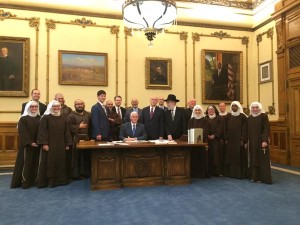In a move that seems both almost incomprehensible, and yet somehow perhaps not surprising in our political climate, Indiana Governor Mike Pence signed legislation today that could potentially allow discrimination against members of the LGBT community. Amanda Terkel of The Huffington Post writes that “The Religious Freedom Restoration Act would allow any individual or corporation to cite its religious beliefs as a defense when sued by a private party.” Concerns over legalized discrimination have prompted Salesforce, a Fortune 500 company to state that it will avoid future business in Indiana, and Gen Con, one of the largest gaming conventions in America, has threatened to stop holding its convention in Indiana.
This bill is based upon both bad jurisprudence, and bad theology. Is this really the way in which religious leaders, including members of the Catholic Church such as those represented in this  photo, want to stand up in defense of religious liberty? Do we want to use the fundamental tenet of American democracy as an excuse to discriminate against our own citizens, against our own brothers and sisters in Christ? I submit that this is not the face of religious liberty that we need to defend in America today.
photo, want to stand up in defense of religious liberty? Do we want to use the fundamental tenet of American democracy as an excuse to discriminate against our own citizens, against our own brothers and sisters in Christ? I submit that this is not the face of religious liberty that we need to defend in America today.
This bill strikes me as one of the most ironic and perverse applications of religious liberty imaginable: a fundamental principle of the United States’ Bill of Rights, enshrined in the First Amendment non-establishment clause, is now being used to sanction discrimination. The ironies of history and politics know no bounds. The framers of our Constitution and Bill of Rights wanted to create an enduring political and legal structure that would ensure that no group in America would be able to leverage its particular beliefs in order to discriminate against those with whom they disagree. They saw this as a necessary foundation for a free and just society. As we are apparently going to have to continue to deal with laws such as this one, Catholic citizens – and others – involved in such debates would do well to turn to Thomas Aquinas’s discussion of the virtue of epikeia. The purpose of epikeia is to acknowledge that when interpreting and applying a particular law, a legislator or judge will have the freedom to take into account the original intention of the law-maker, and apply the law properly and in line with that original intention. Such a move is warranted, Aquinas claims, even if one must act in contrast to the literal interpretation of a particular law. No doubt there will be Constitutional appeals to laws such as Pence’s Religious Freedom Restoration Act. One can only hope that epikeia (along with charity) will be expressed in the overturning of this law as contrary to the original intentions and purposes of the very religious freedom upon which this country is built.




I can’t find Anne argument here, nor a respond to the arguments of the bill’s supporters. Al I can tell is, you really don’t like it and you see the supporters as failing massively. I’m curious why I should share your feelings about the matter. I’m also curious how you come to your interpretation of the Framers’ intentions in the first amendment and why we ought to be bound by them 225 years later. I thought their intent was to stop people from having to support a religion they disagree with through taxes and to ensure no one would be hindered from practicing his religion. I don’t know of any intent to drop discrimination. Where do you find that?
Thanks for your post, Tom. I agree that the name of this legislation is ironic. I wonder if other companies will do what the CEO of Salesforce has claimed they will do. If so, this will certainly backfire. But we’re in a sad state when a Fortune 500 company is the voice of compassion instead of the church.
I think you have a basic misunderstanding of the law. You might find this article helpful.
http://www.southbendtribune.com/news/opinion/viewpoint/viewpoint-correcting-misimpressions-about-religious-freedom/article_5873a636-20b1-59ee-90d6-aae9f80ba0a7.html